A world where innovation and technology are at your fingertips every day. This is the world shaped by the chief executive officers of Google. From its early days as a search engine project to becoming a tech giant, Google’s journey is a testament to visionary leadership.
The “chief executive officers of Google” plays a pivotal role in steering the company through ever-evolving tech landscapes. Each CEO, with their unique vision, has contributed to Google’s success story. As you delve into their roles, responsibilities, and leadership styles, you’ll uncover the secrets behind Google’s dominance in the tech realm.
The Role Of A CEO At Google
The Chief Executive Officer at Google holds a pivotal position in guiding the company toward its objectives. This role encompasses several key responsibilities that are essential for maintaining Google’s status as a leader in technology.
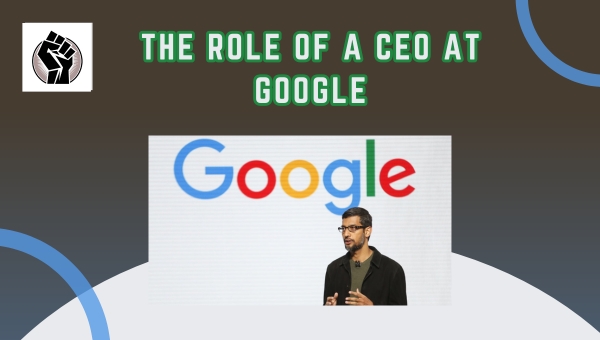
- Vision and Strategy: The CEO is responsible for establishing a clear direction for Google’s future. This involves setting long-term goals and ensuring the organization remains competitive in the tech industry.
- Leadership: A vital aspect of the CEO’s role is to inspire and guide teams, fostering a culture of innovation. This requires effective communication skills and the ability to motivate employees to achieve their best.
- Decision-Making: High-stakes decisions are a routine part of the job. The CEO must weigh options carefully, considering the potential impact on the company’s direction and success.
- Stakeholder Engagement: Maintaining strong relationships with investors, employees, and partners is crucial. The CEO must communicate effectively to align these stakeholders with the company’s vision and objectives.
The CEO’s leadership is instrumental in ensuring Google adapts to market changes and technological advancements, keeping the company at the forefront of the tech world.
Key Responsibilities And Challenges
The Chief Executive Officer (CEO) of Google holds a pivotal role in guiding the company through its strategic and operational landscape. Their responsibilities include shaping the company’s vision, making critical decisions, and ensuring alignment with market trends.

Strategic Planning And Vision
To maintain Google’s position as a tech leader, CEOs engage in comprehensive strategic planning. This involves:
- Long-term Vision: Crafting a clear vision that aligns with technological advancements and market demands.
- Resource Allocation: Strategically allocating resources to prioritize innovative projects and initiatives.
- Stakeholder Engagement: Collaborating with stakeholders to ensure that the vision is well-understood and supported across the organization.
Navigating Industry Changes
In an ever-evolving tech landscape, Google’s CEOs must adeptly respond to rapid changes. Key actions include:
- Market Analysis: Continuously monitoring industry trends to anticipate shifts and adapt strategies accordingly.
- Innovation Adoption: Embracing new technologies and methodologies to stay ahead of competitors.
- Agile Leadership: Implementing agile practices that allow for quick pivots in response to unforeseen challenges or opportunities.
These responsibilities and challenges are essential for ensuring Google remains a dominant force in the technology sector.
Also Read: CEO of Netflix: The Visionaries Behind Streaming Revolution
Notable Chief Executive Officers Of Google
Google’s journey as a technology leader has been significantly shaped by its notable CEOs. Each has brought unique strengths and visions, contributing to the company’s growth and innovation.
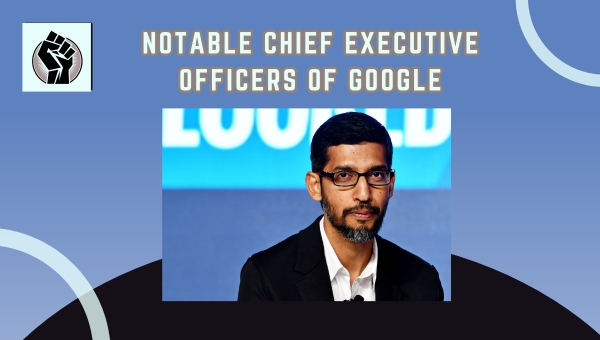
1. Larry Page (1998 – 2001)
Larry Page, co-founder of Google, served as its first CEO from 1998 to 2001. His early leadership was crucial in establishing the company’s foundational technology and corporate culture.

Page’s vision centered around creating a search engine that prioritized speed and accuracy, which led to the development of the PageRank algorithm—an innovative method for ranking web pages based on their relevance and authority.
- Innovative Mindset: Page encouraged a culture of experimentation, allowing engineers to pursue ambitious projects.
- User-Centric Design: He emphasized simplicity in design, ensuring that the user experience was intuitive and effective.
- Initial Growth: Under his leadership, Google transitioned from a university project to a commercial entity, attracting significant investment and user interest.
- Focus on Technology: Page’s technical background enabled him to drive advancements in search technology, laying the groundwork for future innovations.
His tenure set the stage for Google’s rapid ascent in the tech industry.
2. Eric Schmidt (2001 – 2011)
Eric Schmidt took over as CEO in 2001 and played a pivotal role in scaling Google’s operations and expanding its global reach. His leadership transformed Google into a powerhouse of innovation and market influence.
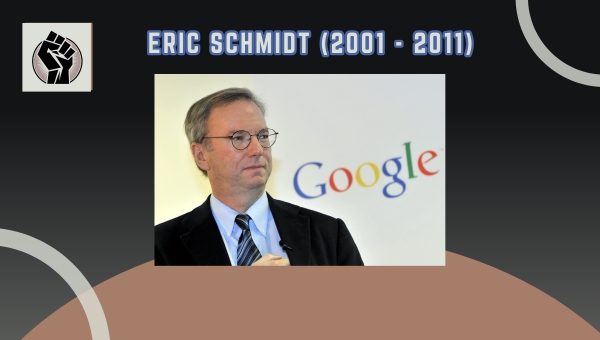
- Strategic Expansion: Schmidt focused on diversifying Google’s product offerings, introducing key services like Gmail, Google Maps, and YouTube, which significantly broadened Google’s ecosystem.
- Corporate Structure: He implemented a more structured management approach that allowed Google to maintain agility while growing rapidly.
- Globalization: Schmidt led efforts to expand Google’s presence internationally, establishing offices worldwide and adapting products for local markets.
- Acquisitions: Under his guidance, Google made strategic acquisitions that enhanced its capabilities, including the purchase of YouTube in 2006.
Schmidt’s tenure was marked by significant growth, positioning Google as a leader in various tech sectors.
3. Larry Page (2011 – 2015)
Larry Page returned as CEO in 2011 with a renewed focus on innovation and new ventures during his second term. His leadership style emphasized bold initiatives and long-term vision.
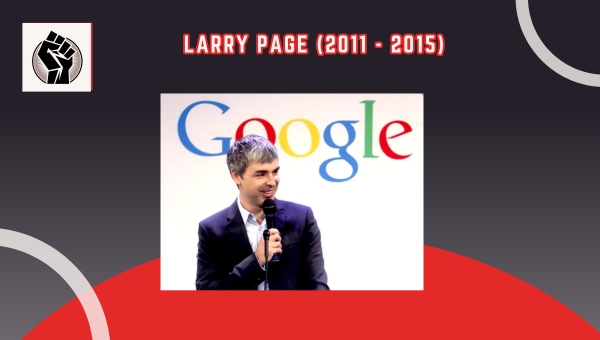
- Alphabet Inc. Formation: Page spearheaded the restructuring of Google into Alphabet Inc., creating a parent company that allowed for greater focus on diverse projects beyond search.
- Investment in Innovation: He championed investments in emerging technologies such as artificial intelligence, self-driving cars through Waymo, and health initiatives via Calico.
- Mobile Strategy: Page prioritized mobile computing by enhancing Android’s capabilities, ensuring Google remained competitive in the mobile market.
- Culture of Innovation: He fostered an environment where employees were encouraged to take risks and pursue ambitious projects, further solidifying Google’s reputation as an innovator.
Page’s vision during this period helped Google navigate the rapidly changing tech landscape.
4. Sundar Pichai (2015 – Present)
Sundar Pichai became CEO in 2015 and has focused on advancing artificial intelligence (AI) development while strengthening Google’s core products. His leadership is characterized by a commitment to innovation and user-centric solutions.
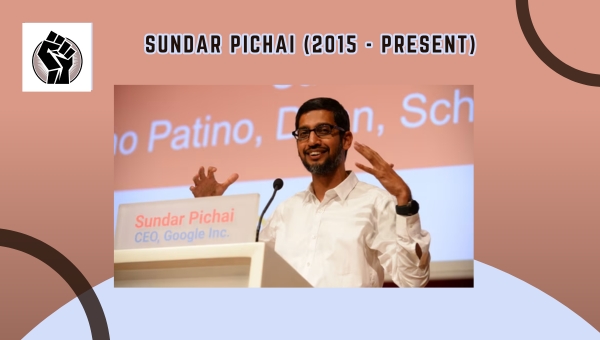
- AI Leadership: Pichai has prioritized AI as a central element of Google’s strategy, overseeing initiatives like Google Assistant and advancements in machine learning technologies.
- Product Enhancement: He has worked on improving existing products such as Search, YouTube, and Chrome, making them more intuitive and integrated with AI capabilities.
- Ethical Considerations: Pichai emphasizes ethical AI development, addressing concerns related to privacy and bias while promoting transparency in AI applications.
- Global Connectivity: Under his leadership, Google has expanded efforts to increase internet access globally through initiatives like Project Loon.
Pichai’s focus on innovation and responsible technology positions Google for continued success in an increasingly complex digital landscape.
Leadership Styles And Impact
The leadership styles at Google have played a significant role in shaping its growth and success over the years. Different leaders have brought unique approaches that have influenced the company’s innovative spirit and work environment. By examining these styles, we can understand how they have contributed to technological advancements and a dynamic corporate culture.
Innovation And Technological Advancements
Google’s leaders have consistently encouraged a culture of innovation by:
- Promoting Risk-Taking: Encouraging employees to experiment and explore new ideas without fear of failure.
- Collaborative Environment: Fostering teamwork across various departments to enhance creativity and problem-solving.
- Investment in R&D: Allocating substantial resources to research and development to stay ahead in technology.
Corporate Culture And Employee Engagement
Maintaining a vibrant corporate culture is vital for employee satisfaction and productivity. At Google, this is achieved through:
- Inclusive Environment: Creating a workplace that values diversity and different perspectives.
- Employee Programs: Implementing initiatives that boost employee morale and retention.
- Open Communication: Encouraging transparent dialogue to strengthen team collaboration.
These leadership strategies ensure that Google remains a leader in both innovation and employee engagement, driving the company’s ongoing success.
The Future Of Leadership At Google
As technology continues to evolve, the future leaders of Google will require a blend of innovative qualities to keep the company at the forefront of the tech world.
Future CEOs will need to be adaptable, embracing change and steering the company through the complexities of AI ethics, data privacy, and global regulations. Visionary thinking will be paramount, guiding the company toward new technological horizons while maintaining its core values.
Emotional intelligence will also be key, as it helps in understanding and motivating a diverse workforce. Leaders must foster a culture of collaboration and creativity, ensuring employees feel engaged and valued.
Additionally, they should possess a strong understanding of global markets and cultural nuances to effectively lead in an interconnected world. By integrating these qualities, future leaders can drive Google’s growth and innovation in an ever-changing environment, keeping it as a tech leader for years to come.
Also Read: Ceo Of Tesla: The Driving Force Behind EV Revolution
History of Google
Google was founded in 1998 by Larry Page and Sergey Brin while they were Ph.D. students at Stanford University. Initially conceived as a search engine project, it quickly gained attention for its innovative algorithms and user-friendly interface.
Its growth was rapid, and by 2004, Google had gone public, firmly establishing itself as a leader in technology. In 2015, a significant restructuring took place when Google became a subsidiary of Alphabet Inc. This change allowed the company to focus more broadly on various ventures beyond just search.
Today, Google is a major player in the tech industry, renowned for its contributions to internet services, artificial intelligence, cloud computing, and hardware. Its continuous expansion into diverse technological fields underscores its commitment to innovation and progress.
FAQs
Who is the owner of Google?
Google is owned by Alphabet Inc., a parent company that was created during a corporate restructuring in 2015. Larry Page and Sergey Brin, Google’s co-founders, are major shareholders of Alphabet Inc.
Who is the Current CEO of Google?
As of now, the CEO of Google is Sundar Pichai. He took over the role in 2015 and is known for focusing on artificial intelligence and user-centric innovations.
What year was the first-ever Google search?
The first Google search occurred in 1998. It marked the beginning of Google’s journey as a revolutionary search engine designed to organize and simplify web information.
Conclusion
The role of the Chief Executive Officers of Google is multifaceted and pivotal in steering the company’s future. From strategic planning to navigating industry changes, Google’s CEOs have consistently driven innovation and maintained its position as a tech leader.
Understanding their leadership styles and the challenges they face provides valuable insights into the company’s success. As Google continues to evolve, future leadership will need to adapt to new technological landscapes while fostering a dynamic corporate culture.
If you found this article insightful, explore more on our site for a deeper dive into the world of technology and leadership.





